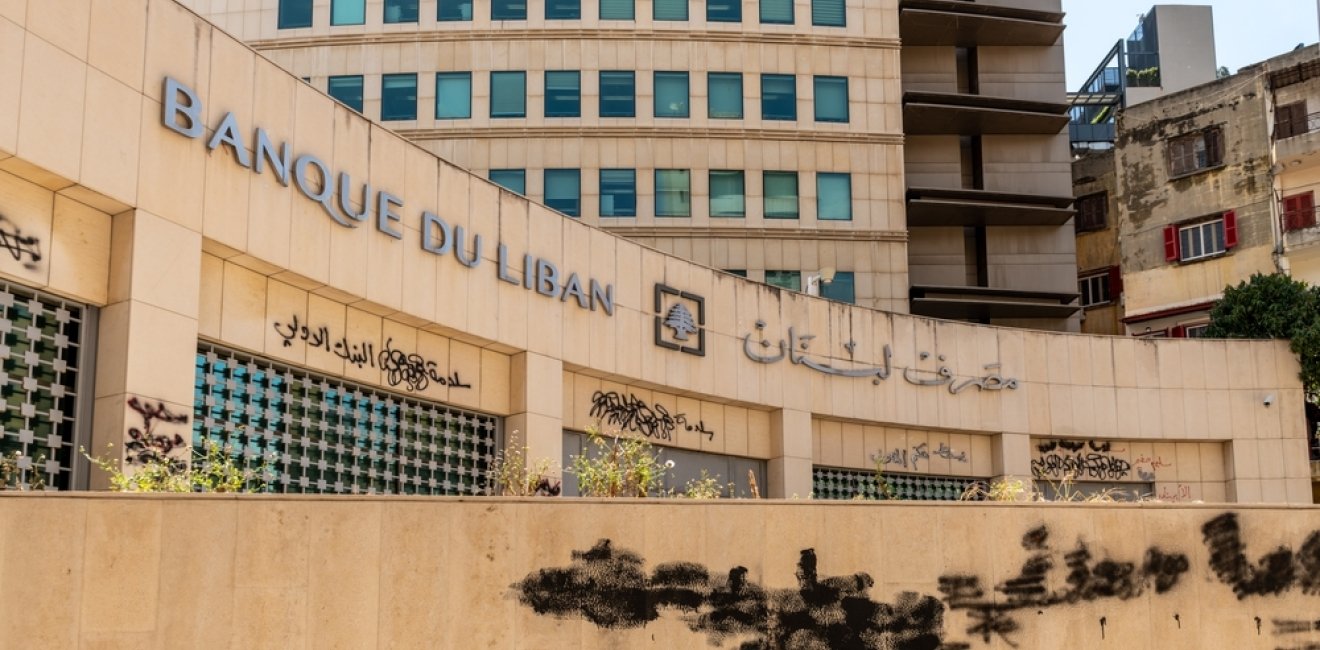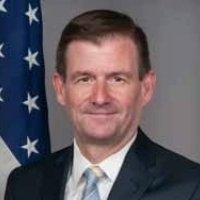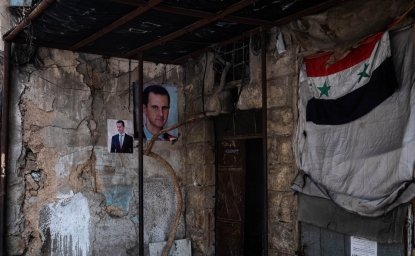There is no shortage of opinions on what to do about Lebanon's multiple crises, which have paralyzed the nation's finances, economy and governance, and produced degradation for most Lebanese on a catastrophic scale. Too often, these opinions focus on symptoms and not the underlying disease. As proposed in a recent white paper published by the Wilson Center, the absence of true sovereignty and a functioning state are the root causes of Lebanon's plight. Addressing those fundamentals will take time, a precious commodity for a nation suffering such stress.
The absence of true sovereignty and a functioning state are the root causes of Lebanon's plight.
Most eyes are fixated on the Lebanese presidency, left vacant since the end of President Michel Aoun's term in October 2022. These vacancies occur now with regularity after every six-year term, resulting in paralysis and crisis. "Vacancy fever" then grips Paris and Washington, where officials abhor the vacuum without appreciating that filling it at any price can be very costly. This particular vacancy is worse than most as it coincides with the existence of a caretaker government with limited authority and a socioeconomic crisis so great it defies description. Lebanese leaders are bound by sectarian power-sharing formulas that impede action at the best of times; without a president and a functioning cabinet, the country's ability to deal with the situation is further impeded—but not completely blocked.
New hand at the bank
Reforms need to start somewhere, in order to put Lebanon on a path toward building its sovereignty and state. There is no better, nor more urgent place to start than in the financial and banking sector, where the immediate manifestations of the current crisis were first felt in 2019. The July 31 departure of long-term Central Bank of Lebanon (CBL) Governor Riad Salameh provides just that opportunity. In the absence of a president of the republic, the Lebanese were unable to appoint a new governor, a position reserved by tradition for a Maronite Christian.
However, the senior vice-governor, Wassim Mansouri, has been accepted as the acting governor. He has pledged to pursue the country's pending reform agenda. To be effective, Mansouri will have to overcome two personal issues, and a third institutional one. First, he is a lawyer, not a financial expert, so he will need to demonstrate his technical competence early on. Second, he is Shia with a reputation for personal closeness to the speaker of parliament, Nabih Berri. He should establish that any past links he may have had with the speaker will not influence his independent standing at the Central Bank. Institutionally, he should act swiftly in response to the just-released Alvarez & Marsal audit of the bank, by introducing state-of-the-art governance and internal controls, to restore confidence in it.
He should establish that any past links he may have had with the speaker will not influence his independent standing at the Central Bank.
Mansouri's first few days as acting governor were dominated by a debate over CBL financing of the government. In the past, the CBL bought massive amounts of government treasury bills, effectively lending money to any incumbent government without adequate legal authority or realistic intentions to decrease its exposure to the government. Mansouri seeks a law to permit restricted interim borrowing, a timetable to end the practice, and a repayment plan.
Recalcitrant elites
His stance is a refreshing indication of an end to permissiveness. However, the focus on government indebtedness misses the priority of the moment, which is stabilizing the currency and restructuring the financial sector, not facilitating government spending. There is no mystery as to the essential elements of such stabilization, which were agreed upon at the staff level between Lebanese authorities and officials of the International Monetary Fund (IMF) in April 2022.
They entail pain and losses, tradeoffs, and political compromises; few states or politicians make such commitments lightly or cheerfully. The 2022 agreement may need updating in light of the current financial and socioeconomic situation, which has only gotten worse, but evading reforms is not an option. Last December, a team under the Wilson Center's Lebanon Ideas Forum met with a broad cross-section of Lebanese political, economic, and civil society leaders and activists. We heard from some quarters a disturbing sense of complacency, based on a misperception that Lebanon had turned a corner and that the financial sector could recover without recourse to the IMF or accounting for the estimated $72 billion in losses between 2019 and 2022.
The 2022 agreement may need updating in light of the current financial and socio-economic situation, which has only gotten worse, but evading reforms is not an option.
This wishful thinking seems based on a slight decrease in Lebanon's debt-to-GDP ratio in 2022. As the World Bank has noted, this drop resulted from currency depreciation exceeding the fall in GDP in nominal dollar value—hardly cause for celebration. In 2023, the World Bank foresees continued economic contraction, currency devaluation, and inflation (which reached a rate of 171% in 2022), trends which can only worsen over time and reduce the policy options available to Lebanese leaders.
Moreover, Lebanon is increasingly a black market and a dollarized, cash economy, creating an environment in which bad actors such as Hezbollah will further thrive. The acting governor, in his role as head of the Special Investigation Commission (SIC), is responsible for countering money laundering, terrorist financing, and sanctions evasion. International help is needed now to enhance the SIC's ability to monitor booming cash transactions and tackle these problems.
Time to act
But the real solution is in restructuring the financial system, as the IMF reiterated to the press after its Article IV consultations with the Lebanese in June 2023. Mansouri identified the essential components in his first statement as acting governor: adoption of a capital control law and a financial restructuring law. On the currency, he proposed ending the “Sayrafa” exchange platform, which had been criticized by the IMF and the World Bank as ineffective and favoring certain elites.
These measures, if shaped in accordance with the best international standards, will help restore confidence in the financial sector and the currency. That development would provide a firmer foundation and clearer economic picture in which to tackle government indebtedness in the context of the 2023 state budget, which Mansouri suggested should be addressed within six months. As emergency measures, all these steps can be taken despite the government's caretaker status and absence of a president—if there is political will.
Unfortunately, such will is lacking in Lebanon, as is so often the case. As the World Bank noted, a dispute over distribution of the banking sector's losses is an impediment to restructuring the sector. Who takes the $72 billion haircut: bank shareholders, depositors, taxpayers, or a mix? No outsider can make that determination. A resolution will re-quire compromise among Lebanese sectarian leaders, who are hardly disinterested, personally or politically. And the more they wait, the more depositors and taxpayers may lose—a reason why a "do nothing" policy prevails.
As the World Bank noted, a dispute over distribution of the banking sector's losses is an impediment to restructuring the sector.
The most the IMF and World Bank will express is the hope that a decision will be made soon to avoid compounding the losses arising from the sector's insolvency, and that small depositors will be afforded some measure of protection. These kinds of decisions are difficult in any society; they are even harder in fragmented Lebanon, with a state that is weak by design in order to ensure no sectarian faction uses it to dominate the others. Yet, some steps are possible without waiting for an agreement on the $72 billion in losses. For example, allowing new banks to open and foreign banks to enter the market is possible and would bring growth and capital to Lebanon while strengthening its anti-money laundering and counter-terrorist financing capabilities.
The international role
The French government has focused on the election of a president as the first-step to addressing Lebanon's other ills, with effort centered on talks among Qatar, Saudi Arabia, Egypt, the United States, and France (the "Quint"). At a July meeting in Doha, they adopted a "carrot and stick" approach to the political situation in Lebanon. It included a credible threat of sanctions against spoilers, as well as a Qatari carrot of conditioning agreed-upon investment in developing Lebanon's offshore gas resources on a political breakthrough. However, French efforts have paused for August, delaying another Quint round on the political crisis until everyone is back from the Cote d'Azur in September.
Meanwhile, the new, acting CBL governor is refocusing attention on financial sector and currency reform. Here is a fleeting opportunity to put Lebanon on a path to stabilization
while addressing core American interests in countering money laundering, terrorist financing and sanctions busting in Lebanon's expanding black market. Without high-level, external pressure, Mansouri and his credible proposals could be devoured by the Lebanese political powers-that-be. The presidential vacancy is bad, but the financial crisis may be worse when measured by human costs.
The presidential vacancy is bad, but the financial crisis may be worse when measured by human costs.
Similar, well-considered international pressure—"tough love" carrots and sticks—from the Quint to compel responsible, practical financial sector reform could help the new hand at the helm of the Central Bank. The time to act is now, and American leadership is overdue.
The views expressed in these articles are those of the author and do not reflect an official position of the Wilson Center.







